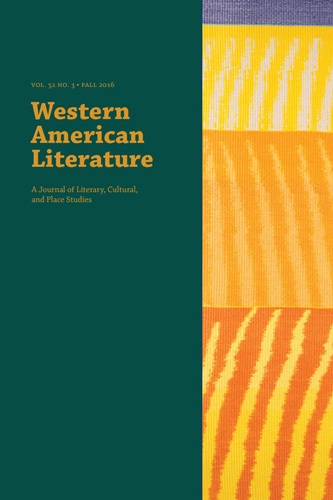Western American Literature – Fall 2016
After reading the Fall 2016 issue, I can certainly see why the Western American Literature magazine is a “leading peer-reviewed journal in the literary and cultural study of the North American West.” This magazine provides a wealth of information, such as studies on emerging authors, a collection of book reviews, and essays that analyze literature or new theoretical approaches in literature about the American West.
After reading the Fall 2016 issue, I can certainly see why the Western American Literature magazine is a “leading peer-reviewed journal in the literary and cultural study of the North American West.” This magazine provides a wealth of information, such as studies on emerging authors, a collection of book reviews, and essays that analyze literature or new theoretical approaches in literature about the American West.
In the “My Dear Judge” essay by Stephen J. Mexal, the author examines and connects Owen Wister’s The Virginian, Oliver Wendell Holmes Jr., and Natural Law Conservatism. Mexal provides an interesting discussion on the idea that society creates natural laws, and Wister’s work ties together a western conservative vision with a legal foundationalism viewpoint. He defines and explains conservatism, both as a term and as a construction that came out of the American West, and then later defines legal foundationalism and its ties to the Lynch Law. To explain these viewpoints, Mexal explores Wister’s background, his stance on law, and the influence his relationship with Holmes had on his writing and viewpoints.
Most importantly, Mexal points out that Wister’s writings supported the idea that circumstances of the Old West era justified lynching. For example, in The Virginian, rustlers were excused from execution by juries through “jury nullification”: “the legal right of juries to acquit defendants that are guilty, typically in response to an unjust law or unjust application of a law.” In this book, “The Virginian” plans to conduct extrajudicial executions of rustlers who had otherwise escaped the law, an idea supported by Wister and Holmes because they believed that the savagery of the west has led to jury corruption. Based on the study in this essay, I can see how jury nullification might cripple a justice system from carrying out its assigned duties. However, I also found that the concept of needing the Lynch Law contradictory since even Wister’s book says the ordinary citizen can “take justice back into his own hands where it was at the beginning of all things.” Overall, the analysis is very interesting and gave me insight into western conservatism and foundational law.
Another analysis that I found particularly interesting in this issue was “The Displaced Aristocrat as Tragic Hero in Tobias Wolff’s This Boy’s Life” by Myles Weber. Weber explores how Toby (Tobias’s younger self) undergoes a premature midlife crisis and engages in some very un-gentlemanly behaviors in his youth. Later, Toby then seeks to correct his position in life by finding a way into the upper echelons of society—through some deceit, but then later through honest, hard work.
One of the most interesting ideas presented by Weber is that Wolff believed he needed to undergo this “transformation” from a reckless youth in order to become the tragic hero he seeks to be in his own life, both on and off the page. Weber reminds us, “Toby’s untruthful correspondence with Alice is a possible precursor to the ostensibly factual memoir we hold in our hands, which, as with all memoirs, the reader must approach with guarded suspicion.” This ties together the entire idea that Wolff presents this miscreant behavior of his youth in order to later justify his tragic hero status when he does finally overcome it to become a well-educated gentleman of high class. Even still, I am reminded that memoirs are a personal creation where an individual may be trying to push a certain concept or theme.
Part of this issue included reviews of books on western travels, the concepts of borderlands, and Western communities. One such book review was by Katherine Bahr who reviewed David Pace’s Dream House on Golan Drive. As Bahr states, “Dream House explores the cultural and religious experiences of the distinctly western Mormon population.” Bahr focuses on some key aspects of Pace’s story, which is about a young Mormon who had recently moved to Salt Lake City, and then follows him throughout his life. Her review examined some key parts of the book, concluding, “This delightful, sophisticated novel ought to appear as a significant blip on the radar of western literature scholars.” Her review certainly encouraged me to seek out the book on my own, and I look forward to reading it.
As an English professor, I found this issue of Western American Literature to be highly enlightening, containing concepts and ideas that I think will find their way into my own classrooms with my students. The book reviews included also gave me details on a few other books I would like to read. I would certainly recommend this magazine to anyone interested in the literary and cultural studies of western literature in America.
[www.westernlit.org/about-wal]





